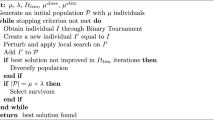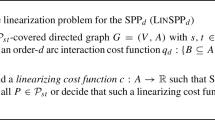Abstract
We introduce and analyze several models of schedulingn different types (groups) of jobs onm parallel machines, where in each group all jobs are identical. Our main goal is to exhibit the usefulness of quadratic programming approaches to solve these classes of high multiplicity scheduling problems, with the total weighted completion time as the minimization criterion. We develop polynomial algorithms for some models, and strongly polynomial algorithms for certain special cases. In particular, the model in which the weights are job independent, as well as the generally weighted model in which processing requirements are job independent, can be formulated as an integer convex separable quadratic cost flow problem, and therefore solved in polynomial time. When we specialize further, strongly polynomial bounds are achievable. Specifically, for the weighted model with job-independent processing requirements if we restrict the weights to be machine independent (while still assuming different machine speeds), anO(mn+n logn) algorithm is developed. If it is also assumed that all the machines have the same speed, the complexity of the algorithm can be improved toO(m logm+n logn). These results can be extended to related unweighted models with variable processing requirements in which all the machines are available at time zero.
Similar content being viewed by others
References
Aho, A. V., J. E. Hopcroft, and J. D. Ullman. 1974.The Design and Analysis of Computer Algorithms, Addison-Wesley, Reading, MA.
Brucker, P. 1984. An Algorithm for Quadratic Knapsack Problems.Operations Research Letters 3(3), 163–166.
Bruno, J. L., E. G. Coffman, Jr., and R. Sethi. 1974. Scheduling Independent Tasks to Reduce Mean Finishing Time,Communications of the ACM 17, 382–387.
Galal, Z., S. Macali, and H. Gabow. 1986. Priority Queues with Variable Priority and anO(EV logV) Algorithm for Finding a Maximal Weighted Matching in General Graphs,SIAM Journal on Computing 15, 120–130.
Garey, M. R., and D. S. Johnson. 1979.Computers and Intractability: a Guide to the Theory of NP-completeness, Freeman, San Francisco, CA.
Granot, F., and J. Skorin-Kapov. 1993. On Polynomial Solvability of the High Multiplicity Total Weighted Tardiness Problem,Discrete Applied Mathematics 41, 139–146.
Granot, F., J. Skorin-Kapov, and A. Tamir. 1994. On Solvability of High Multiplicity Scheduling Problems on Parallel Machines, Working Paper, SUNY, Stony Brook, NY.
Hochbaum, D. S., and R. Shamir. 1991. Strongly Polynomial Algorithms for the High Multiplicity Scheduling Problem,Operations Research 39, 648–653.
Hochbaum, D. S., and J. G. Shanthikumar, 1990. Convex Separable Optimization is Not Much Harder than Linear Optimization,Journal of the ACM 37(4), 843–862.
Hochbaum, D. S., R. Shamir, and J. G. Shanthikumar 1992. A Polynomial Algorithm for an Integer Quadratic Non-Separable Transportation Problem,Mathematical Programming 55, 359–371.
Horn, W. A. 1973. Minimizing Average Flow Time with Parallel Machines,Operations Research 21, 846–847.
Ibaraki, T., and N. Katoh. 1988,Resource Allocation Problems: Algorithmic Approaches, MIT Press, Cambridge, MA.
Lawler, E. L., J. K. Lenstra, A. H. G. Rinnooy Kan, and D. B. Shmoys. 1993. Sequencing and Scheduling: Algorithms and Complexity, inHandbooks in Operations Research and Management Science, Volume 4, eds. S. C. Graves, A. H. G. Rinnooy Kan, and P. Zipkin, North-Holland Amsterdam, pp. 445–522.
Minoux, M. 1986. Solving Integer Minimum Cost Flows with Separable Convex Objective Polynomially,Mathematical Programming Study 26, 237–239.
Pardalos, P. M., and N. Kovoor. 1990. An Algorithm for a Singly Constrained Class of Quadratic Programs Subject to Lower and Upper Bounds,Mathematical Programming 46, 321–328.
Tamir, A. 1993. A Strongly Polynomial Algorithm for Minimum Convex Separable Quadratic Cost Flow Problems on Two-Terminal Series-Parallel Networks,Mathematical Programming 59, 117–132.
Author information
Authors and Affiliations
Additional information
Communicated by N. Megiddo.
The research of Frieda Granot was partially supported by Natural Sciences and Engineering Research Council of Canada Grant 5-83998. The research of Jadranka Skorin-Kapov was partially supported by National Science Foundation Grant DDM-8909206.
Rights and permissions
About this article
Cite this article
Granot, F., Skorin-Kapov, J. & Tamir, A. Using quadratic programming to solve high multiplicity scheduling problems on parallel machines. Algorithmica 17, 100–110 (1997). https://doi.org/10.1007/BF02522821
Received:
Revised:
Issue Date:
DOI: https://doi.org/10.1007/BF02522821




